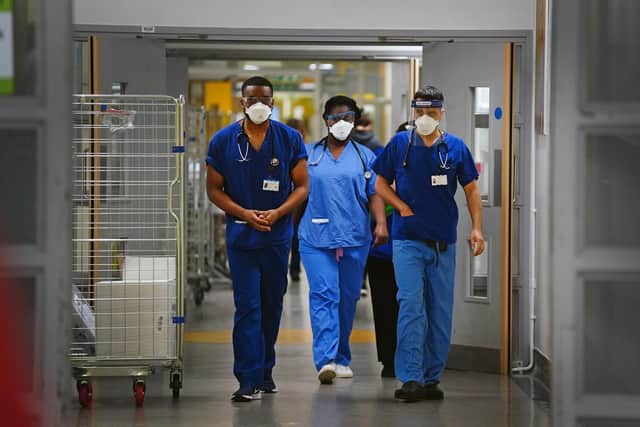Covid inquiry: 'structural racism' led many black and minority staff not heard on PPE
and live on Freeview channel 276
‘Structural racism’ within the NHS led to some black and minority ethnic healthcare workers not heard after they raised concerns about issues including ill-fitting face masks in the pandemic, the Covid inquiry has been told.
The Federation of Ethnic Minority Healthcare Organisations (Femho) general secretary Ade Adeyemi said there was a feeling of powerlessness on hearing about such problems for some staff who were encouraged to work anyway.
Advertisement
Hide AdAdvertisement
Hide AdAt Friday’s hearing, he explained how there are “stark” differences in how black and ethnic minority patients and workers were treated in the NHS, and indicated a lack of consideration as to how well face masks might fit on someone with a beard or wearing a headscarf due to their religion.


Mr Adeyemi said: “It was difficult to find the right PPE (personal protective equipment) and this gave us a sense of the lack of, again, the belief of what we were saying.
“That the system can pick up signals and noise and disruption in other areas but when there’s noise and disruption of black and Asian ethnic minority workers, it’s not heard and it’s not responded to immediately.”
Asked by inquiry counsel Andrew O’Connor KC if what he was describing could be considered “structural racism”, Mr Adeyemi replied: “If it quacks like a duck and it walks like a duck, it’s a duck.”
Advertisement
Hide AdAdvertisement
Hide AdMr Adeyemi said the organisation had been contacted by healthcare workers about the face fit test which ensures that PPE fits securely, was not done correctly.
He said: “We have so many examples of again just WhatsApp messages, and it’s so traumatic to receive them and feel powerless because we’re hearing those things, we’re hearing the face fit test isn’t done properly.
“Some ward managers aren’t seeing the results that it’s not fitting well and they’re actually still being encouraged to work.
“And you know, there’s a kind of toxic mess here.
“I described earlier about the power imbalances which mean most of our members didn’t feel able to raise those concerns and the brave ones that did weren’t listened to.
Advertisement
Hide AdAdvertisement
Hide Ad“But it was a palpable thing that we said ‘these things don’t always fit us well, there are some people who need extra appendages so it can go around the hijab etc’. Not listened to, not believed, not responded to.”
He added: “The evidence is very clear, both as patients, as service users of the NHS and social care system, and also as professionals both in a professional sense in a work capacity, the difference that we see with our white counterparts is stark and it’s been existing for many years.”
It is these differences that led to the formation of Femho around a year before the pandemic, he said, so there can be shared knowledge to try to address a problem that “hasn’t been meaningfully, substantively addressed”.
Comment Guidelines
National World encourages reader discussion on our stories. User feedback, insights and back-and-forth exchanges add a rich layer of context to reporting. Please review our Community Guidelines before commenting.
